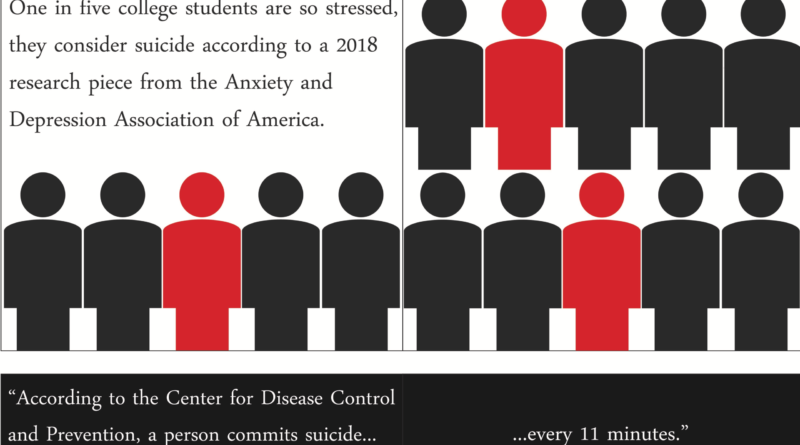Dark humor and the trivialization of mental health
Students need to step away from fatalistic memes as a form of therapy
According to the Center for Disease Control and Prevention, a person commits suicide every 11 minutes.
For those between the ages of 18 to 24, the National Institute of Mental Health reports that they are more likely to have suicidal ideation and attempts, with a Harvard Medical Report stating that 1 in 5 college students have suicidal thoughts.
Statistically speaking, that means there are students on this campus who are currently in a situation where the thought of suicide is a very real and dangerous possibility, and even more frightening of thought is that some may try to act on them.
So why are so many students making jokes about it?
While we don’t like to discuss it, college students have a tendency to use dark and fatalistic humor to cope with the stress of school. It’s a nearly universal language among students, a calling card among the student bodies across America, spoken in only attempts at a degree. I use this humor all the time, but it was not until recently that I saw the problem with it.
We ask for cars to hit us as we walk across streets so they can pay our loans, or share memes about wishing we were dead during the midst of typing an essay or studying for an exam.
I’m certainly just as guilty of this, as I use a mix of self-deprecating and self-defeating humor throughout my days here to try and make it seem easier.
According to data from the National Institute of Mental Health (NIMH), in 2017, suicide was the second-highest cause of death amongst those between the ages of 15 to 24, beating other causes like homicide by a large margin.
On average, there are 7.5 deaths for every 100,000 students within the United States. While the rates of suicide have been up, fewer students have been reaching out for help.
Students can sometimes feel like they are too stressed to do anything, or that they may be without help. When incidents like this occur, your room and bed seem like the safest place to be, and that’s where the memes and jokes come into play.
We should want to be better, to be treated better and in order to do that we must do more than laugh through the pain and stress that we are dealing with.
When you’re juggling essays, worries of loans, extra credit and other payments, your mental health may not be given the time and care that it needs. The time and money needed to see someone about it aren’t available, but memes are at the tips of your fingers.
You can see them everywhere, from Instagram to Twitter, and everywhere in between.
We laugh and sympathize with the others around us, but we never do more. A call for help is lost in a sea of bad jokes, and people slip through the cracks. It’s easy to lose track of someone else’s thoughts when you’re already lost in your own.
When we treat these ideas and actions as punchlines and props for what some may call “therapeutic” humor, we run the risk of trivializing or normalizing them.
By doing so the severity of these issues can be overlooked, leading to further feelings of helplessness or isolation amongst students.
We should want to be better, to be treated better and in order to do that we must do more than laugh through the pain and stress that we are dealing with.
As a student body and as human beings we need to see that these jokes are detrimental. When stressed and feeling overwhelmed, they should not feel like they just have to grin and bear it, or respond that they’re just “living the dream.” We need to help one another, in any way we can.
If you are having suicidal ideation or are struggling with these ideas please reach out and contact the National Suicide Prevention Lifeline at 1-800-273-8255 or text “COURAGE” to the Crisis Text Line at 741-741.




